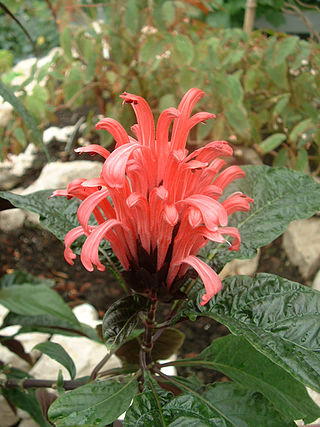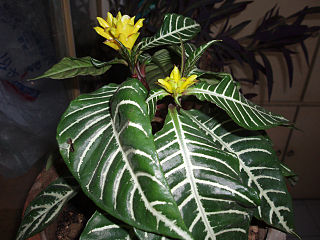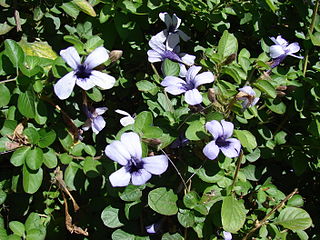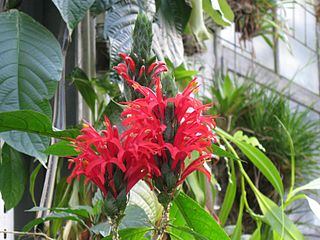
Acanthaceae is a family of dicotyledonous flowering plants containing almost 250 genera and about 2500 species. Most are tropical herbs, shrubs, or twining vines; some are epiphytes. Only a few species are distributed in temperate regions. The four main centres of distribution are Indonesia and Malaysia, Africa, Brazil, and Central America. Representatives of the family can be found in nearly every habitat, including dense or open forests, scrublands, wet fields and valleys, sea coast and marine areas, swamps, and mangrove forests.

Justicia is a genus of flowering plants in the family Acanthaceae. It is the largest genus within the family, encompassing around 700 species with hundreds more as yet unresolved. They are native to tropical to warm temperate regions of the Americas, India, and Africa. The genus serves as host to many butterfly species, such as Anartia fatima. Common names include water-willow and shrimp plant, the latter from the inflorescences, which resemble a shrimp in some species. The generic name honours Scottish horticulturist James Justice (1698–1763). They are closely related to Pachystachys.

Aphelandra is a genus of over 200 species of flowering plants in the family Acanthaceae, native to tropical regions of the Americas.

Ruellia is a genus of flowering plants commonly known as ruellias or wild petunias. They are not closely related to petunias (Petunia) although both genera belong to the same euasterid clade. The genus was named in honor of Jean Ruelle (1474–1537), herbalist and physician to Francis I of France and translator of several works of Dioscorides.

Dicliptera is a genus of flowering plants in the bear's breeches family, Acanthaceae. It includes 223 species native to the tropics and subtropics worldwide. Well-known synonyms include Peristrophe and Dactylostegium.

Hygrophila, commonly known as swampweeds, is a genus of flowering plants in the acanthus family, Acanthaceae. There are about 80 to 100 species, of which many are aquatic plants. The genus is distributed across the tropical and subtropical world. It is one of only two genera in its family that contains aquatic plants, the other being Justicia. The genus is treated in the tribe Hygrophileae, which is noted as being in need of revision at the genus level, meaning the current taxonomic boundaries of Hygrophila are likely to change in the future.

Poikilacanthus is a genus of flowering plants in the family Acanthaceae. It includes 13 species native to the tropical Americas, ranging from central Mexico to northern Argentina.

Lepidagathis is a genus of flowering plants in the family Acanthaceae. It includes 151 species native to the tropics of the Americas, sub-Saharan Africa, south and southeast Asia, southern China, Malesia, and New Guinea.

Dianthera is a genus of flowering plants in the family Acanthaceae. It includes 41 species native to the Americas, ranging from eastern Canada to northern Argentina.

Chionanthus, common name: fringetrees, is a genus of about 140 species of flowering plants in the family Oleaceae.

Stenandrium is a genus of flowering plants in the family Acanthaceae native to the Americas, with 50 species of perennial herbs ranging from the southern United States to northern Argentina and central Chile.
Acanthopale is a plant genus of shrubs or subshrubs in the Acanthaceae plant family. The genus name is based on the classic Greek words for thorn ákantha and stake palum. Some species in the genus are cultivated as ornamental plants.

Odontonema, the toothedthreads, is a genus of flowering plants in the family Acanthaceae. It includes 32 species native to the tropical Americas, ranging from Mexico to Peru and southeastern Brazil.

Pseuderanthemum is a genus of plants in family Acanthaceae with a pantropical distribution.

Rondeletia is a genus of flowering plants in the family Rubiaceae. It is endemic to the Neotropics. There are around 160 species.

Mimulopsis is a genus in the flowering plant family Acanthaceae with about 20 species native to tropical Africa and Madagascar.

Oplonia spinosa, the pricklybush, is a species of plant in the family Acanthaceae, endemic to several Caribbean islands. It is a spiny shrub ranging in height from dwarf to 3 meters, with curved spines 4–12 mm long, and leaves variable in size and shape.

Dyschoriste is a genus of flowering plants in the family Acanthaceae. It includes 98 species native to the tropics and subtropics of the Americas, sub-Saharan Africa, and southern Asia. Members of the genus are commonly known as snakeherb.

Pachystachys is a genus of 12 species of flowering plants in the family Acanthaceae, native to rainforest in the Caribbean and Central and South America. They are evergreen perennials and shrubs bearing prominent terminal spikes of flowers with brightly coloured bracts.


















